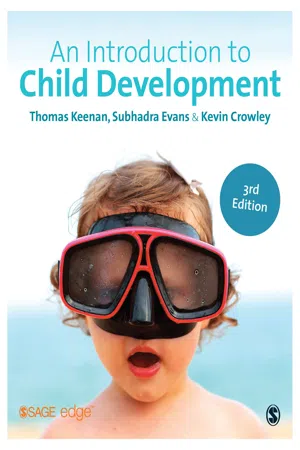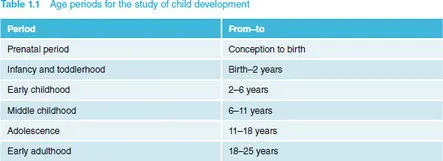Introduction
The world abounds with budding psychologists. The fact that you are sitting down right now reading this text suggests that you may be one yourself. At the least, you are likely to be interested in understanding yourself or any number of other people, including your parents, siblings, friends or even children in general. How can we best gain insight into our own and our family members’ past actions and predict their future behaviour, emotions and cognitions? The field of psychology, in general, and developmental psychology, in particular, is concerned with these very questions. We hope, through reading and studying this text, you will gain greater awareness of a number of important psychological questions, including how we develop and grow as a fetus from the very beginning, to how children learn about moral behaviour, and what happens when things go wrong with typical development. As you will discover, there are still many unanswered questions, but we are increasingly expanding on the knowledge of previous generations of psychologists. Perhaps you will become one of the very scientists working so hard to fill in the gaps of our knowledge about human development.
Life-span developmental psychology is the field of psychology which involves the examination of both constancy and change in human behaviour across the entire life span, that is, from conception to death (Baltes, 1987). Table 1.1 below shows the age periods that child development is typically divided into. Developmental psychologists are concerned with diverse issues, ranging from the growth of motor skills in the infant to the gains and losses observed in the intellectual functioning of the elderly. The goal of study in developmental psychology is to further our knowledge about how development evolves over the life span, developing a knowledge of the general principles of development and the differences and similarities in development across individuals. The range of topics comprising the study of modern psychology is vast, and encompasses sub-areas as diverse as social psychology, comparative psychology, the study of learning, neuropsychology, abnormal psychology, and cognitive psychology. However, the study of development is possible within each of these areas. Thus, in one sense, developmental psychology can be thought of as an approach that one takes to the broader study of psychology (Buss, 1995).
This text focuses on a relatively narrow portion of the life span, specifically the time development between conception and adolescence. This area of study is known as the study of child development. Understanding children is important in its own right and also has the potential to significantly inform us about the nature of human development. By studying the earlier forms of behaviour and the changes which behaviour undergoes, we can gain a better understanding of the ‘end product’, that is, adult behaviour. While this text focuses specifically on children’s development, the wider principles of life-span developmental psychology (which we discuss shortly) apply as equally to this area as they do to the study of development across the life span.
What is ‘Development’?
When we speak of development, what in fact are we referring to? One frequently used definition refers to this as patterns of change over time which begin at conception and continue throughout the life span. Development occurs in different domains, such as the biological (changes in our physical being), social (changes in our social relationships), emotional (changes in our emotional understanding and experiences), and cognitive (changes in our thought processes). Some developmental psychologists prefer to restrict the notion of development only to changes which lead to qualitative reorganizations in the structure of a behaviour, skill or ability (Crain, 2000). For example, Heinz Werner (1957) argued that development refers only to changes which increase the organization of functioning within a domain. Werner believed that development consisted of two processes: integration and differentiation. Integration refers to the idea that development consists of the integration of more basic, previously acquired behaviours into new, higher-level structures. For example, according to Piaget (1952), a baby who learns to successfully reach for objects has also learned to coordinate a variety of skills, such as maintaining an upright posture, moving their arm, visually coordinating the position of their hand and the object, and grasping the object under an integrated structure called a scheme. New developments build on and incorporate what has come before.
Differentiation refers to the idea that development also involves the progressive ability to make more distinctions among things, for example, learning to adjust one’s grasp to pick up small objects (which requires the use of the fingers and fine motor control) versus larger objects (which only requires closing the hand around the object and less fine motor control). Werner defined development as a combination of these two processes of integration and differentiation: he saw development as a process of increasing hierarchical integration and increasing differentiation. Of course, Werner’s view of development is by no means universally accepted within developmental psychology. Many developmentalists argue that anything which evidences change over time is relevant to the study of development (Crain, 2000). Thus, this debate remains a tension within the study of human development.
The Study of Child Development: A Brief History
Developmental psychology emerged as an area of study early on in the history of psychology. Charles Darwin, the founder of evolutionary theory, was an early pioneer in the study of children. Darwin (1877) kept records about the development of his own infant son, and used the data he collected to understand human development in light of the theory of evolution by natural selection. Darwin’s work and a host of similar records of children’s development – known as baby biographies – were among the first studies of human development and the source of many modern ideas about children’s development (Charlesworth, 1992). Baby biographies were often criticized for their emotional and biased descriptions of children, yet it is also recognized that many of the early baby biographers, such as William Preyer, set extremely high standards for observing and recording behaviour accurately (Cairns, 1998).
One of the first developmental psychologists was the American psychologist G. Stanley Hall. Hall’s research in child development focused on questions such as what do children know when they go to school? In an early paper entitled ‘The Contents of Children’s Minds on Entering School’ (Hall, 1891), Hall used questionnaires and interviews to assess what children knew: information that can be potentially of great use to teachers. Hall (1904) also published on adolescence, describing adolescence as a time of sturm und drang (or storm and stress). In short, Hall believed emotional turbulence and conflict were a normative part of adolescence, a view which today is not widely confirmed by research (Steinberg, 1990).
In Canada, a significant event in the history of developmental psychology was the appointment of James Mark Baldwin to the faculty of the University of Toronto in 1889 (Green, 2004). Baldwin was a pioneer in the area of mental development, studying topics ranging from imitation to intentionality (see Chapter 11 for further discussion of intention and the child’s theory of mind). Another major development in Canada was the opening of the St George’s School for Child Study in 1926, headed by the developmental psychologist William Blatz. Blatz was famous for his study of the Dionne quintuplets, a group of five sisters (Blatz, 1938).
The psychologist John B. Watson (1928) took a very different approach to child development from Hall and other early pioneers. Watson argued for the primacy of environmental influences on children’s development. In short, his view was that all development was ultimately the result of learning. Watson pioneered the study of learning mechanisms and contributed greatly to modern learning theories. He is also famous, or perhaps infamous, for his Little Albert experiment (described in Research Box 2.1). In contrast, Arnold Gesell took a position that was the opposite of Watson’s. Gesell (1925) believed that development was the result of our genetic endowment, a view that is known as maturation. Gesell focused on describing the norms that characterized children’s development, concentrating on when children typically acquire a given behaviour (such as walking) and the extent to which many behaviours are affected by environmental influences such as practice or training.
The study of children’s development has also been greatly influenced by the work of a group of prominent twentieth-century psychologists, laying the foundations for the field of developmental psychology as it exists today. Jean Piaget (1896–1980) took an organismic approach to cognitive development, arguing that it was the development of mental structure within the child’s mind that determined how that child understood the world. Under Piaget’s view, cognitive development is a constant dance between the way in which a child’s cognitive structures shape their view of the world, and the need for that child’s cognitive structures to adapt or change in light of new information or learning. The interplay between these two processes leads to a continual reorganization of knowledge into knowledge structures that are better adapted to the world.
In contrast to Piaget’s work, the Russian psychologist Lev Vygotsky postulated a sociocultural theory of cognitive development (Vygotsky, 1978). Vygotsky argued that a child’s cognitive development occurred within the context of social interactions with more experienced members of that child’s culture, making cognitive development a truly social process. Children build on their innate perceptual and memory skills and acquire the mental tools of their culture, such as language and number, as well as the symbol systems that allow them to manipulate and reflect on these tools. For Vygotsky, understanding children’s development was a matter of understanding children’s acquisition of these mental tools (Rogoff, 1990).
Broader changes within the field of cognitive psychology during the 1960s had an important influence on the study of children’s cognitive development. The study of information processing, or how information is taken in and flows through a child’s cognitive system causing various outputs or responses, was an important influence on developmental psychologists interested in children’s thinking (Klahr & Macwhinney, 1998). Information processing psychologists most often focus on how children take in or encode information from their environment, how they represent it to themselves, and how they operate on their representations of knowledge to create outputs or products (Siegler, 1998), like the solution to a math problem or an answer to a question about what Winnie the Pooh will do next.
This review of the history of developmental psychology is by no means full or complete, and the interested student is recommended to pursue fuller accounts of the history of the discipline. However, it will allow us to go on and examine development within a variety of domains while understanding something of the origins of many of the ideas we will encounter.






